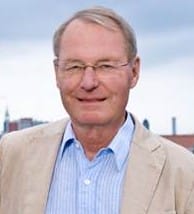In early December, Wharton again put its new curriculum where its proverbial mouth is when the Management Department sponsored and hosted the inaugural “Wharton School Global Summit: Euro 2013.” The culminating event of MGMT 611 also provided highly anticipated insights and predictions about the ongoing eurozone crisis.
The main attraction was an intellectual spar between two Hanses—Hans Humes, chairman and CEO of Greylock Capital Management LLC, who is more optimistic about the euro, and Hans-Olaf Henkel, professor of international management at the University of Mannheim, who has publicly rescinded his support for the eurozone.

Hans-Olaf Henkel
“It is like a Greek tragedy. I don’t know if you know Greek tragedies, but they all end tragically,” Henkel told the Wharton audience.
In Henkel’s view, the richer eurozone countries like Germany would need to become less competitive to make the eurozone work for their already less competitive neighbors. But he opposed the proposition of restructuring whole countries to fix a currency.
Henkel’s solution: Let the strong countries leave the zone “for a while,” allow the euro to devalue, and at least offer the weaker countries a fighting chance to become more competitive.
Yet Humes intimated that Germany might not be as well off as assumed, given the amount of European debt that its banks have on the books. He warned of “inflationary paranoia” and of the precedent of Argentina, which defaulted on its sovereign debt in early 2002 and “took the easy way out,” in Humes’ mind—and is now less competitive for it.

Hans Humes
Humes’ solutions to the current European debt crisis: more banking authority, a single taxation scheme across the zone, and (here’s a point upon which the Hanses might agree) the ending of certain cultural “bad habits.”
The Wharton School Global Summit was the final part of MGMT 611, “Managing the Established Enterprise.” The first major part of the course dealt with fundamental issues of strategy, examining issues central to the competitive position of an enterprise. The second part of the course stressed the fact that organizational life is built around a complex interplay of social forces. The third part of the course focused on the deep and persistent cross-national differences in economic, political and social institutions that affect organizations. The Global Summit then took place on Dec. 7, preceded by the students’ presentations of their final papers and followed by group discussions.
The course was led by instructors Witold Henisz, the Deloitte & Touche Professor of Management; Nicolaj Siggelkow, the David M. Knott Professor, chair of the Management Department and co-director of the Mack Center for Technological Innovation; and Michael Useem, the William and Jacalyn Egan Professor of Management and director of the Center for Leadership and Change Management.

























